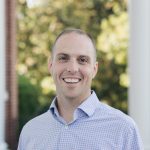My older brother, Brandon, serves as principal of the public high school from which we both graduated. He recently told me a story about a kid we’ll call Cory who was in and out of Brandon’s office for reasons mostly related to drug possession. As Brandon questioned Cory about the situation, he discovered Cory’s problem wasn’t drug use — it was his family.
Cory’s parents were using him to deliver drugs to another kid at school, who then delivered them to his own parents. Their logic was that if Cory got caught, his punishment, as a minor, would be minimal. If they got caught, it would likely entail jail time. In other words, lower risk for him than for them.
In one emotional conversation with Cory, Brandon asked, “Do you want out of this?” With teary eyes, Cory said, “Show me how! There ain’t no way out of this!”
After Brandon shared this story with me, he asked about my job as a college and seminary professor: “What do you do every day?” I told him about various theology courses and students preparing for pastoral ministry and mission work. I also expressed my great delight in my work despite its challenges.
Less than three minutes after telling me about Cory, Brandon said, with all sincerity, “I just don’t see how what I do is as important as what pastors, missionaries or seminary professors do.”
My jaw dropped, and my heart broke. How could Brandon conclude that his work is less valuable than mine? The question was a turning point.
The metaphorical space between the “ordained” and the “ordinary” in the church is unfortunate and unbiblical.
I was immediately gripped by the gravity of Paul’s words that apostles, prophets, evangelists, shepherds and teachers are gifted “to equip the saints for the work of ministry, for building up the body of Christ” (Ephesians 4:12). And I was awakened to the problem of the pulpit-pew divide — the centuries-old chasm between those who occupy the pulpit and those who occupy the pew.
The physical space between pulpit and pew in worship spaces is necessary for practical reasons. The metaphorical space between the “ordained” and the “ordinary” in the church, however, is unfortunate and unbiblical.
Every-Member Ministry
Ephesians 4:12 is the driving force behind our new book Every Waking Hour. In this verse, Paul disrupts a misconception that is common among contemporary Christians — namely, that the ordained among us do the work of ministry. Is it true that those who receive a paycheck from a local church or Christian non-profit do ministry? Of course.
The problem, however, is in assuming that they are the only people in ministry or that their ministry — or work — is more important than anyone else’s.
We argue that every Christ-follower is a minister by virtue of his or her relationship to God and the world around them. This stance is not merely an attempt to make Christians who do not work in full-time ministry feel valued — although they certainly are. It’s a case for an “every-member ministry” — especially at work. Further, it’s a biblical, theological and practical framework for how to understand your work as ministry and then execute your work in fulfillment of the Great Commandment to love God and your neighbor.
Every Christ-follower is a minister.
We pray that Every Waking Hour will alert God’s people to the reality that every Christian wears a clerical collar. Paul taught us that anyone who is “in Christ… is a new creation (2 Corinthians 5:17). But let us not neglect what he said next: “All this is from God, who through Christ reconciled us to himself and gave us the ministry of reconciliation” (2 Corinthians 5:18). In light of this, all God’s people must be intentional in joining our work with God’s work of making all things new.
This post originally published on April 19, 2016. It is a modified excerpt from Every Waking Hour by Benjamin Quinn and Walter Strickland. Learn More>>





Comments and Pingbacks
2016-04-19 19:05:52
Free Stuff: Win a Copy of Every Waking Hour | Intersect
[…] Read an Excerpt from ‘Every Waking Hour’ […]
2016-06-20 14:45:52
Work and the True Story of the Whole World | Intersect
[…] that it was good (Gen 1:4, 10, 12, 18, 21, 25, 31). This affirmation dispels the notion of a sacred-secular divide (i.e., dualism), which implies that only part of creation is good. Dualistic thought subverts a […]
2016-09-05 06:31:22
5 Must-Reads for Your Labor Day | Intersect
[…] Destroying the Divide Between Pulpit and Pew […]
2017-05-02 06:31:43
How Can the Church Prepare Christians for the Workplace? | Intersect
[…] because it is in fact the church’s responsibility. Part one of how the church should equip the rest of the saints to do the work of the ministry (which is the language of Ephesians 4) is recognizing that it is the church’s […]
2018-03-15 22:03:40
Editor's Choice: My 10 Favorite Intersect Articles of 2016 | Intersect
[…] Destroying the Divide Between Pulpit and Pew […]
2018-04-05 11:21:22
Around the Horn (April 5) | Prince on Preaching
[…] Destroying the Divide Between Pulpit and Pew […]
2018-09-03 08:16:38
5 Articles for Your Labor Day | Intersect
[…] Destroying the Divide Between Pulpit and Pew […]
2018-11-30 21:48:45
Why Do We Go to Church? | Intersect
[…] local church, both corporately and individually. Therefore, there should be no divide between the Pew and the Pulpit. In fact, the strengths and weaknesses of the members of the local church are intentional, even […]
2019-02-20 06:00:49
3 Misconceptions Christians Have About Work | Intersect
[…] Deep down, many of us believe that paid vocational ministry is more important than so-called secular work. We assume that God values the job of a pastor or missionary more than that of a plumber or accountant. (Here at Intersect we refer to this notion as the pulpit-pew divide.) […]